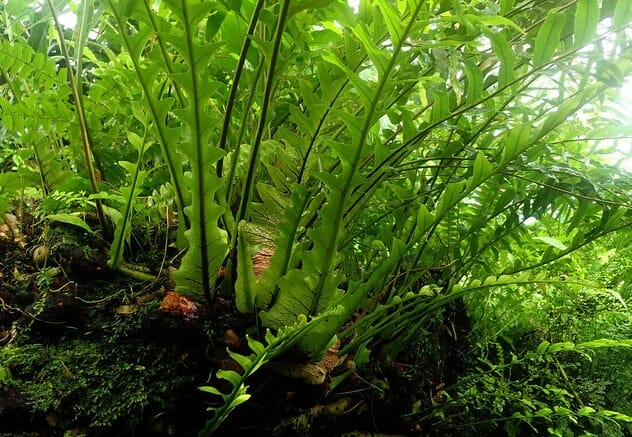Drynaria, Gu Sui Bu 骨碎补
Fortune’s Drynaria RhizomeGu Sui Bu (TCM)
Be ljang re ral བེ་ལྗང་རེ་རལ་ (Tibetan Medicine)
H.S. Hu, R.C. Ching, Icones filicum Sinicarum, vol. 4 (1937)
 Aglaomorpha coronans
Aglaomorpha coronans(Photo by Kenraiz) (Wikimedia)
Botanical name:
Drynaria fortunei (syn. D. roosii, Polypodium fortunei, Aglaomorpha fortunei)
The correct name (since 2016) is Aglaomorpha fortunei, although most TCM texts still refer to Drynaria fortunei.
Local species are used in TCM including D. baronii, D. orientalis, Aglaomorpha coronans (syn. Pseudodrynaria coronans)
Drynaria baronii is used in Tibetan Medicine.
Parts used:
Root
Temperature & Taste:
Warm, dry. Bitter
In Tibetan Medicine it (D. baronii) is classed as Cool and Bitter.
Classifications:
3M. ARTHRITICS
D. Clear Wind and Damp
N. Tonics
Uses:
1. Tonifies the Kidneys, Strengthens the Bones:
-weakness and pain of the Lower Back and Knees
-Arthritic disorders, Rheumatic Arthritis, Osteoarthritis (TCM, Tibet)
-useful during recovery from injury to the Soft Tissues, Bones and Joints (TCM)
-Loss of hearing, Tinnitus (TCM, Tibet)
-Loose Teeth, Bleeding Gums
-Chronic Diarrhea from Kidney deficiency.
-‘damage and injury of the tendon and bone’ (Su Song)
-good for ‘5 Overstrains and 6 Exhaustions’ (Zhen Quan)
-‘Heat in the upper part and Cold in the lower part of the body’. (Zhen Quan)
2. Moves the Blood, Promotes Healing of Sinews and Bones:
-Trauma, Bruising, Contusions, Sprains
-Fractures and Dislocations
-especially useful for soft tissue damage of the Tendons and Ligaments
-‘good for removing blood stasis and stopping bleeding’ (Kai Bai Ben Cao)
-‘good to treat abdominal pain of a woman due to disorder of Blood and Qi’. (Su Song)
3. Resists Poison: (Tibetan Medicine)
-resists all types of Poison (including Food poisoning)
-Hot disorders associated with Poison.
-Intoxication of the Bone’ (Zhen Quan)
-‘It treats Malignant sores’ (Da Ming)
4. Externally:
-topically for pain and swelling from Trauma, especially of the joints
-tincture is used topically in Hair Loss and Alopecia. (TCM, Tibet)
Dose:
Decoction: 9–20 grams
Powder: 1.5–4 grams
Preparation:
The fine hairs are generally rubbed or burned off.
1. Steamed Drynaria Gu Sui Bu:
It is commonly steamed, then sliced and sun-dried.
2. Sand-Fried Drynaria Gu Sui Bu:
Slices of the root are added to hot sand heated in a wok, then stirred until they swell. They are removed and any remaining hair is brushed off. This facilitates decocting.
3. Honey-prepared Drynaria Gu Sui Bu:
Remove the hair, cut into small pieces, mix with Honey (10% by weight), then steam and sun-dry. (Lei Xiao)
4. Drynaria Gu Sui Bu prepared with Pig Kidney:
‘Grind the drug into powder. Insert the powder into slices of pig kidney and roast. It is good for treating tinnitus, prolonged diarrhea due to Kidney deficiency and toothache’. (Li Shi Zhen)
Main Combinations:
1. Arthritis, chronic Lower Back Pain from Deficiency:
i. Drynaria Gu Sui Bu with Cibotium Gou Ji
ii. Drynaria Gu Sui Bu with Achyranthes Niu Xi and Eucommia Du Zhong.
iii. Drynaria Gu Sui Bu with Du Huo Ji Sheng Tang.
iv. Osteoarthritis and lower back pain, with Cibotium Gou Ji, Epimedium Yin Yang Huo, Dipsacus Xu Duan, Rehmannia Shu Di Huang, Costus (Mu Xiang), Olibanum (Ru Xiang), Myrrh (Mo Yao) (as in Zhuang Gu Guan Jie Wan of the Chinese Pharmacopoeia)
v. Osteoarthritis from deficiency, Drynaria Gu Sui Bu with Spatholobus Ji Xue Teng, Rehmannia Shu Di Huang, Cistanches Rou Cong Rong, Achyranthes Niu Xi, Epimedium Yin Yang Huo (as in Kang Gu Zeng Sheng Wan)
2. Tinnitus:
i. Drynaria Gu Sui Bu with Dioscorea Shan Yao, Dodder seed (Tu Si Zi)
ii. Drynaria Gu Sui Bu is powdered and baked in a Pigs Kidney (Li Shi Zhen)
3. Chronic Diarrhea from Kidney deficiency, take Drynaria Gu Sui Bu with roasted Pig Kidney. (Li Shi Zhen)
4. Toothache and loose Teeth, Drynaria Gu Sui Bu with Rehmannia Shu Di Huang and Asarum Xi Xin
5. Trauma of the muscles, sinews or bones:
i. mix the powder of Drynaria Gu Sui Bu with Millet porridge and apply. (Su Song)
ii. Drynaria Gu Sui Bu with Dipsacus Xu Duan, Frankincense (Ru Xiang), Myrrh (Mo Yao)
Major Formulas:
Zhuang Gu Guan Jie Wan
Kang Gu Zeng Sheng Wan
Cautions:
Safe in normal doses. Toxic side effects have been noted with massive doses (100 grams)
1. Use cautiously in Yin deficiency
